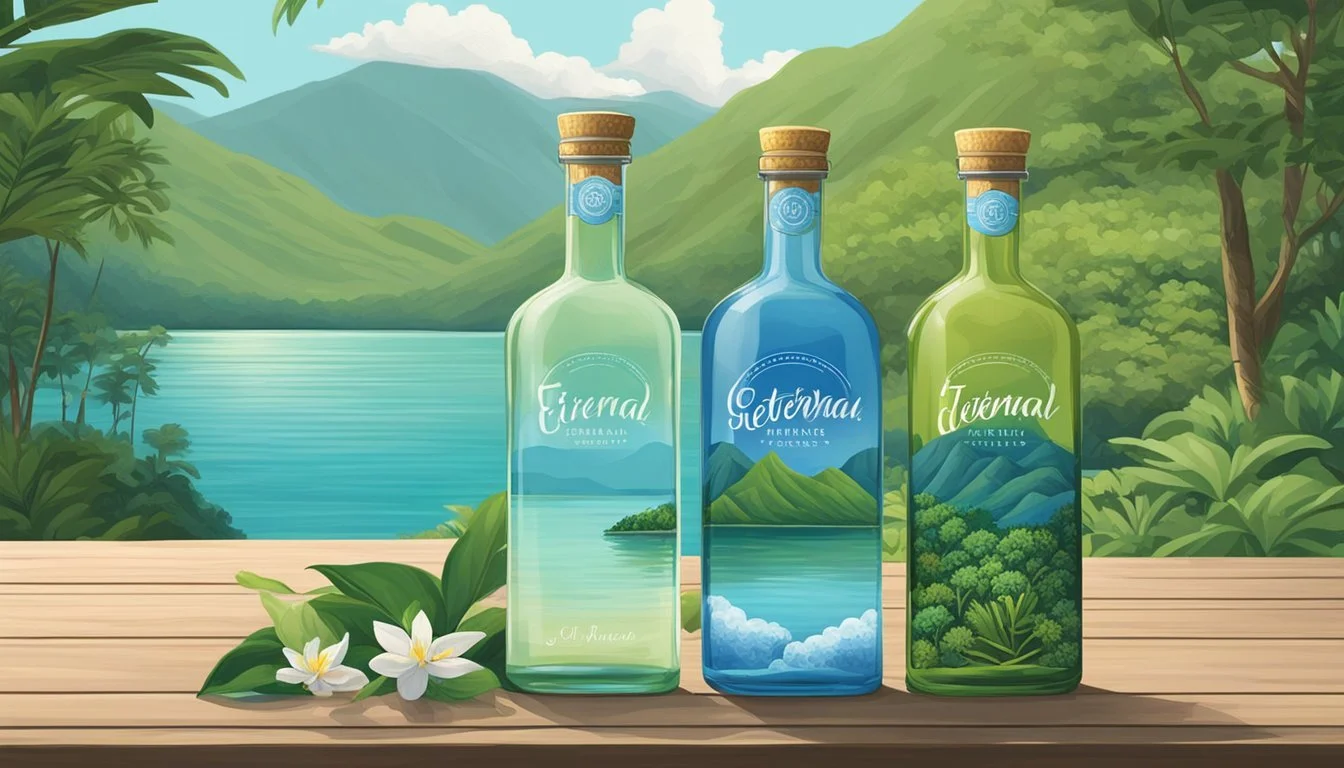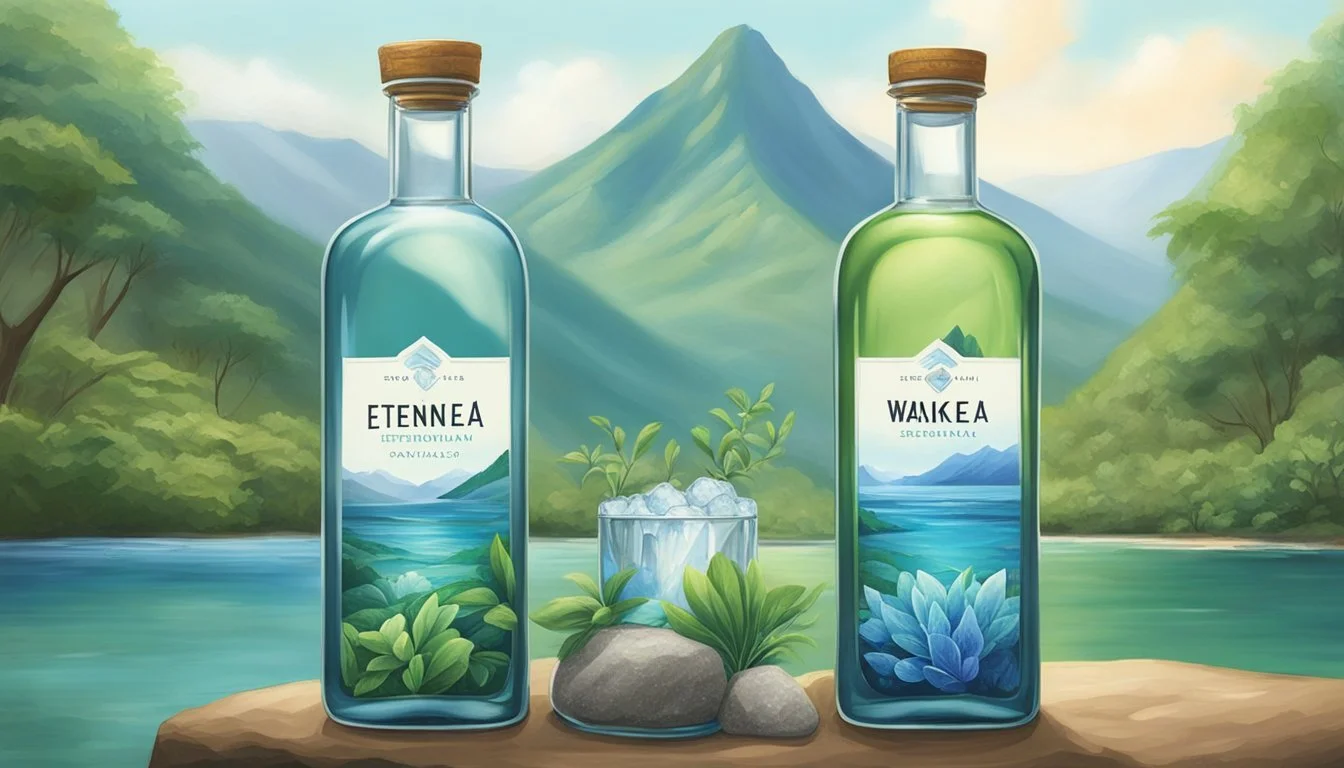Eternal vs. Waiakea
Which Bottled Water is Better for Your Health?
When choosing between Eternal and Waiakea bottled water, it’s essential to consider their key characteristics and benefits. Eternal water is favored for its portability and the energy boost it provides, making it a convenient option for staying hydrated on the go. Its alkaline nature supports hydration and overall well-being.
Eternal's popularity is derived from its clean taste and balanced pH, which appeals to many health-conscious consumers. In contrast, Waiakea water offers a unique experience sourced from a volcanic well in Hawaii. Waiakea's naturally alkaline properties, combined with its rich mineral content, make it stand out for those who seek purity and a taste of Hawaii's pristine waters.
Both brands excel in providing high-quality bottled water, but they cater to slightly different preferences and needs. While Eternal water might be ideal for urban dwellers and those with an active lifestyle, Waiakea appeals to individuals looking for natural mineral benefits and a connection to nature.
Background on Eternal and Waiakea
Eternal and Waiakea are prominent bottled water brands that offer products with unique qualities.
Eternal Naturally Alkaline Spring Water originates from natural springs. This water is known for its natural alkalinity, typically ranging between 7.8 and 8.2 pH. The brand emphasizes purity, sourcing their water from protected artesian springs, ensuring it remains free from contaminants.
Waiakea Water is sourced from Hawaiian volcanic rock. The water's journey through porous volcanic rock enriches it with minerals, resulting in a naturally high alkaline pH of 8.8. Waiakea water also focuses on sustainability, using BPA-free bottles made from 100% RPET and supporting environmental initiatives.
Key Features:
Brand Source pH Level Notable Features Eternal Natural springs 7.8 - 8.2 Naturally alkaline, sourced from protected artesian springs Waiakea Hawaiian volcanic rock 8.8 Naturally alkaline, rich in minerals, sustainable packaging
Both brands appeal to consumers seeking pure, alkaline water but differ significantly in their sources and commitment to sustainability. Eternal focuses on natural spring sources, while Waiakea highlights its unique volcanic rock filtration and environmental responsibility.
Source and Natural Attributes
Eternal and Waiakea waters, although both premium bottled water brands, originate from distinct natural sources that lend unique attributes to each.
Eternal Water Source
Eternal water comes from a naturally alkaline source located in the Northeastern United States. This artesian aquifer is protected deep underground, where it naturally filters through layers of rock, absorbing essential minerals.
The water is bottled at the source without any chemical treatments. Its naturally occurring pH level typically ranges between 7.8 and 8.2, making it mildly alkaline. Eternal water's natural filtration process ensures its purity and mineral content remain intact, offering clean and refreshing taste.
Waiakea Water Source
Waiakea water is sourced from melted snow and rainwater that filters through the porous volcanic rock of the Mauna Loa Volcano in Hawaii. This unique filtration process enriches the water with minerals such as calcium, magnesium, and silica.
Waiakea water is known for its naturally high alkalinity, with a pH level around 8.2. It is also among the first U.S. bottled waters to be certified Carbon Neutral and uses 100% rPET bottles, reflecting a commitment to sustainability. The volcanic filtration process not only purifies the water but also imparts a distinctive, smooth taste.
Water Quality and Contents
Eternal and Waiakea offer unique properties in their bottled water, influenced by mineral content, pH levels, and purity. These attributes set the foundation for evaluating their benefits and potential drawbacks.
Mineral Content Comparison
Eternal water is renowned for its balanced mineral composition. It naturally contains calcium, magnesium, potassium, and silica, contributing to both taste and health benefits. These minerals are essential for bone health and other bodily functions.
Waiakea water, sourced from Hawaii, also offers a rich mineral profile. It includes naturally occurring electrolytes such as sodium, potassium, and magnesium. The unique volcanic filtration process contributes to its distinct mineral content, which some consumers find beneficial for hydration and taste.
pH Level Analysis
Eternal water has a slightly alkaline pH, typically around 7.8. This mild alkalinity is often sought after for its potential benefits in neutralizing body acidity and improving overall hydration.
Waiakea water stands out with a pH range of 7.6 to 8.2, making it a naturally alkaline water. The higher pH level is beneficial for those looking to balance the body's pH levels and support critical bodily functions. Alkaline pH is often linked to enhanced hydration and reduced acidity in the body.
Assessment of Purity
Eternal water is highly praised for its purity, undergoing rigorous filtration processes. The water is sourced from carefully monitored springs, ensuring minimal contamination. Eternal boasts a clean taste, free from fluoride and other potential impurities.
Waiakea water maintains its purity through its unique source in a volcanic well in Hawaii. It is bottled directly at the source, preserving its freshness and quality. The natural filtration through volcanic rock results in water that is free from common contaminants, providing a crisp and pure drinking experience.
Both brands prioritize purity, but their distinct sources and filtration methods offer consumers valuable choices in the bottled water market.
Health and Hydration
Alkaline water can offer unique health benefits and hydration advantages. This section examines the hydration benefits, contributions to bone health, and a comparative analysis for athletes.
Hydration Benefits of Alkaline Water
Eternal and Waiakea alkaline waters are known for their hydration properties. Alkaline water typically has a higher pH level, which can help neutralize acidity in the body.
Waiakea, with a pH range of 7.6 to 8.2, offers mild alkalinity. On the other hand, Eternal, often with a pH close to 9, provides higher alkalinity. Both waters contain electrolytes, essential for maintaining fluid balance and muscle function.
Consumers with acid reflux issues may find alkaline water particularly beneficial, as it can help neutralize stomach acidity. This can promote better overall digestive health and reduce discomfort.
Contributions to Bone Health
Alkaline water like Waiakea and Eternal may support bone health due to the presence of minerals. Waiakea water, sourced from volcanic rock, contains minerals such as silica. Silica plays a key role in collagen synthesis, which is crucial for maintaining bone integrity.
Eternal water also contains essential minerals that support bone density. The presence of calcium and magnesium is beneficial for bone strength. Both brands can be a good option for those looking to enhance their mineral intake.
Comparative Analysis for Athletes
For athletes, hydration and mineral content are critical. Waiakea water, enriched with natural electrolytes, supports hydration during intense activities. The natural alkalinity helps in maintaining pH balance, which is essential during and after workouts.
Eternal water's high pH level can also assist athletes by reducing acidity in the body post-exercise. The consistent mineral content in both brands ensures that athletes receive the necessary electrolytes to maintain energy levels and muscle function.
In summary, both Waiakea and Eternal provide robust options for health and hydration, particularly for those with active lifestyles. Their unique mineral compositions and alkalinity levels cater to diverse needs, making them suitable choices for a variety of consumers.
Environmental Sustainability and Packaging
Eternal and Waiakea both emphasize their commitment to environmental sustainability, but they approach packaging and sustainability initiatives differently. Comparing their bottling processes, packaging materials, and other sustainability efforts reveals key differences.
Analysis of Bottling Processes
Eternal Water sources its naturally alkaline spring water and uses recyclable PET plastic bottles. Their bottling process focuses on maintaining water purity while minimizing environmental impact.
Waiakea Water, on the other hand, sources from a sustainable aquifer with a 1.4 billion gallon recharge rate. The facility uses 33% renewable energy, highlighting a higher commitment to environmental integrity.
Sustainability Initiatives
Eternal focuses on water preservation and reducing plastic waste. They employ recyclable materials and work towards reducing their environmental footprint.
Waiakea surpasses this with a more comprehensive approach. They are certified Carbon Neutral and donate over 5% of revenue to nonprofits. Their community impact and use of renewable energy bolster their sustainability efforts.
Assessment of Packaging Materials
Eternal Water uses BPA-free, recyclable PET plastic, ensuring that their bottles can be reused and recycled efficiently. This material is chosen for maintaining water quality and supporting recycling initiatives.
Waiakea Water uses 100% rPET (post-consumer recycled PET), which uses 85% less energy and 99% less water to produce. This significantly reduces carbon emissions, showcasing a strong focus on using sustainable materials.
In summary, Waiakea displays a more innovative and impactful approach to sustainability and packaging compared to Eternal, though both brands contribute positively to environmental preservation.
Consumer Considerations
When choosing between Eternal and Waiakea bottled water, consumers often consider taste profile, cost, and accessibility. Each brand offers unique benefits that cater to different preferences and needs.
Taste Profile and Preferences
Eternal water is a natural spring water known for its smooth and refreshing taste. It appeals to those who prefer bottled spring water's natural flavors. Waiakea, on the other hand, is volcanic water with a slightly alkaline pH. This gives it a distinct, crisp taste that some consumers find more refreshing. Personal preferences vary, but both brands are praised for their clean flavors and consistent quality.
Cost Factor Analysis
Cost is a crucial factor for many consumers. Eternal water generally falls within the mid-range price for natural spring waters, making it a viable option for everyday consumption. Waiakea, while slightly more expensive, offers added value through its certified Carbon Neutral status and philanthropic efforts. The extra cost may be justified for those who prioritize environmental sustainability and social responsibility in their purchasing decisions.
Convenience and Accessibility
Convenience and accessibility can significantly influence a consumer's choice. Eternal water is widely available in various retail locations, making it easy to find. Waiakea, although also widely distributed, may not be as readily available in some areas. Both brands offer online purchasing options, allowing consumers to buy in bulk and ensure a steady supply. For consumers who prioritize convenience, the brand with better local availability might be the preferred choice.
Comparison with Other Brands
Eternal and Waiakea each have unique qualities that set them apart from other bottled waters. This section explores how they compare with mainstream and premium brands in terms of quality, taste, and added benefits.
Eternal vs. Mainstream Brands
Eternal Water offers a distinct advantage over many mainstream brands like Dasani, Aquafina, and Nestlé Pure Life. Unlike these widely available options, Eternal Water is naturally alkaline, often featuring a higher pH level, which many consumers believe provides better hydration.
Taste and Source
Eternal Water is sourced from protected underground springs, offering a clean, refreshing taste. Brands like Aquafina and Dasani, on the other hand, are purified tap waters, which might not have the distinct mineral content and natural origins that Eternal boasts.
Added Benefits
Mainstream brands typically focus on accessibility and affordability. In contrast, Eternal Water aims to provide health benefits associated with its natural alkalinity and minerals, making it a preferable choice for health-conscious individuals.
Waiakea vs. Premium Brands
Waiakea stands strong against premium brands like FIJI, Essentia, and Voss. It is celebrated not only for its volcanic filtration process but also for its commitment to sustainability.
Quality and Filtration
Waiakea's water is filtered through volcanic rock, imparting a unique mineral profile and alkaline pH. FIJI Water offers a similar mineral-rich profile, while Essentia boasts ionized water with enhanced electrolytes aimed at promoting hydration. Voss, known for its pristine Norwegian sources, emphasizes purity and taste but lacks the sustainability focus of Waiakea.
Sustainability and Ethics
Waiakea is Carbon Neutral certified and donates a portion of its revenue to global nonprofits. This ethical approach compares favorably against premium brands. While FIJI and Voss also emphasize natural purity, Waiakea stands out for its environmental and social initiatives, making it a compelling choice for eco-conscious consumers.
Final Verdict
When comparing Eternal and Waiakea bottled water, several factors come into play.
Taste: Eternal is praised for its refreshing and clean flavor. Waiakea, filtered through volcanic rock, offers a lighter, crisper taste which many find appealing.
Health Benefits: Waiakea boasts silica benefits for hair, skin, and nails. Eternal provides a boost of energy and hydration throughout the day.
Cost: Eternal offers competitive pricing, while Waiakea's premium sourcing might reflect in higher costs.
Sustainability: Waiakea uses 100% RPET bottles and promotes eco-friendly practices. Eternal's sustainability initiatives are less prominent but still significant.
Mineral Content & pH Level: Eternal has a balanced pH and essential minerals. Waiakea features a naturally high alkaline pH of 8.8 and rich mineral content, supporting body functions.
Hydration: Both brands enhance hydration but Waiakea’s higher alkaline level helps neutralize body acidity effectively.
The choice depends on personal preference, health needs, and environmental concerns.
More About Eternal
Eternal vs Icelandic Glacial: Which Bottled Water is Better?
Eternal vs Kirkland Signature: Which Bottled Water is Better?
Eternal vs Mountain Valley Spring Water: Which Bottled Water is Better?
Eternal vs Richard's Rainwater: Which Bottled Water is Better?
Eternal vs Whole Foods Italian Still Mineral water: Which Bottled Water is Better?
More About Waiakea
Icelandic Glacial vs Waiakea: Which Bottled Water is Better?
Mountain Valley Spring Water vs Waiakea: Which Bottled Water is Better?
Waiakea vs Kirkland Signature: Which Bottled Water is Better?
Waiakea vs Richard's Rainwater: Which Bottled Water is Better?
Waiakea vs Whole Foods Italian Still Mineral water: Which Bottled Water is Better?








